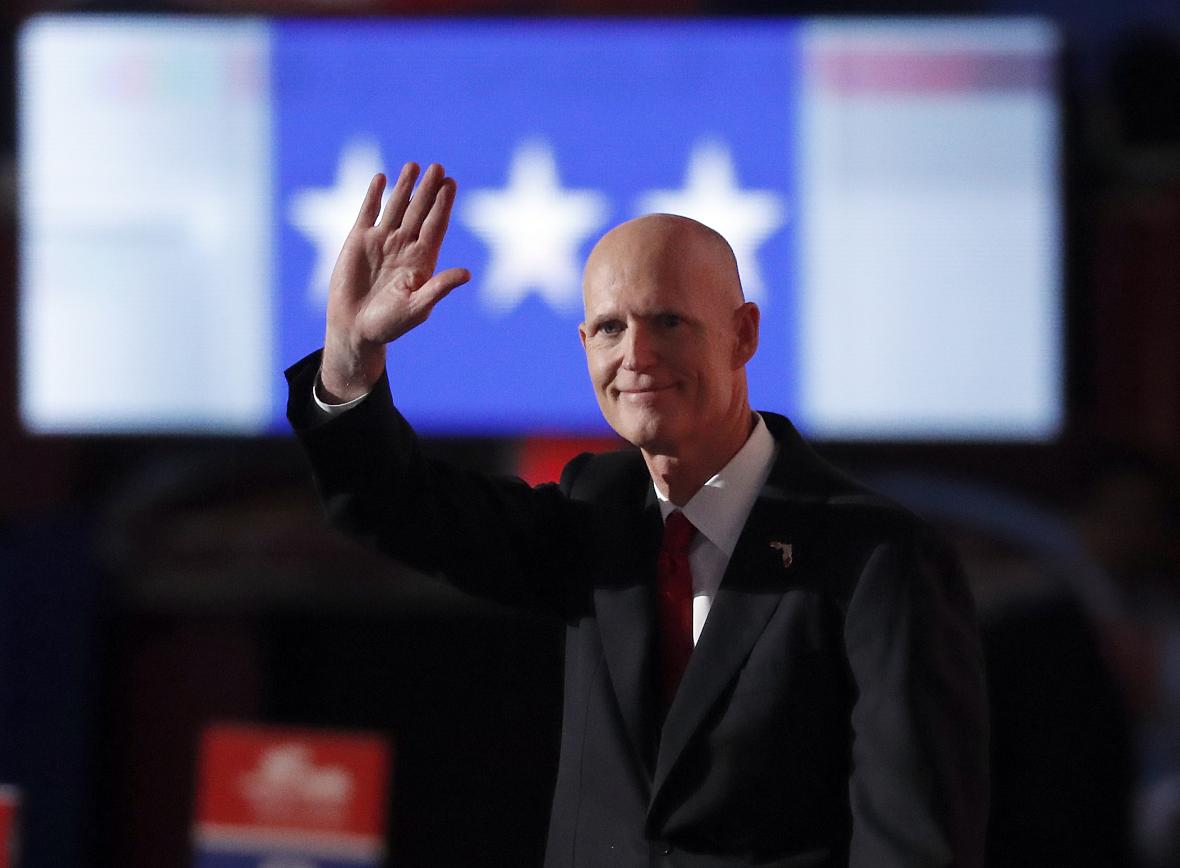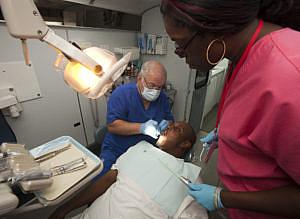Florida legislators fail to act on dental care for low-income communities
Maggie Clark’s reporting on Florida’s Medicaid program for children was undertaken as a project for the Dennis A. Hunt Fund for Health Journalism, a program of the University of Southern California Center for Health Journalism.
Other stories in the series include:
Medicaid in Florida: 2 million kids. $24 billion battle.
Fighting for care in Florida's Medicaid system
An impossible choice: Doctors torn between patients and Florida's Medicaid system
2 Million Kids' series spurs support and quest for more data
Medicaid settlement: Florida will work harder to ensure health care for children

Florida Gov. Rick Scott speaks during the third day of the Republican National Convention in Cleveland, Wednesday, July 20, 2016. (AP Photo/Paul Sancya)
It’s no secret Florida has a dental problem. But a bill that would have likely increased access to dental care and eased some strain on hospital emergency rooms was vetoed by the governor this year.
The bill, which garnered unanimous support in the House and Senate and was supported by the Florida Dental Association, would have provided loan forgiveness and grants to dentists who set up practices in low-income communities and commit to seeing Medicaid and uninsured patients. The communities would have also had to pledge funding to support the new dentist in the community.
“It just seemed to me that providing some financial incentives for a few dentists to go into some acutely needful communities and require those communities to dig into their thin pockets to provide matching funds, and then evaluate the program for economic development — I thought it made good business sense,” said the bill’s sponsor, Sen. Don Gaetz, R-Niceville.
Rural counties in the Florida Panhandle may only have one dentist, let alone a dentist who will see Medicaid patients, Gaetz said. And for the millions of adults without Medicaid coverage or private dental insurance, they can’t afford dental care even if they can get to a dentist.
“We provide millions in financial incentives to other business, including large health insurance companies, and we ought to be looking at incentives that can provide a true return on investment,” Gaetz said. “Ensuring that people get dental care and keeping them out of the emergency room is good public policy.”
But Gov. Rick Scott was not convinced.
“While I agree with the bill sponsors that maintaining good oral health is integral to the overall health of Florida families, I cannot support a program that does not place appropriate safeguards on taxpayer investments … Furthermore, the bill opens the door for state dollars to be used to incentivize other high-income professionals,” Scott wrote in his veto message.
Dentist and State Sen. Alan Hays, left, prepares to remove a tooth from patient Sean Washington on the Florida Baptist Convention’s Mobile Dental Unit at the Central Florida Hampton Center car lot Wednesday morning, June 27, 2012 as dental assistant Allison Whipper, right, watches. (Doug Engle/Star-Banner)
Gaetz had co-sponsored the bill in the 2015 session as well, and passed it through the Senate, but he said the Scott administration signaled it would not support the bill that year and it died in the House. Even unanimous support in both chambers this year did not sway the governor.
The defeat of a bill to promote dental care was familiar to Sen. Alan Hays, R-Umatilla, who is retiring this year after 10 years in the Legislature. A career dentist himself, he said one of his biggest disappointments as a lawmaker was his inability to convince his colleagues of the importance and unique nature of dental care.
“Lawmakers are well-intentioned people, but they don’t know what they’re doing on dental care,” Hays said. “They’re making decisions affecting lives of patients and dentists with little to no information.”
While Gaetz hopes that the bill will return next year, he won’t be able to sponsor it. He is term-limited and won’t return to the Senate next year.
He’ll try to encourage others to advocate for the idea, but said the governor’s veto sent a strong message.
“Getting a veto like this sends a hard chill over an issue,” Gaetz said. “Unless you can come back and say to colleagues, ‘I’ve talked to the governor and fixed the problem and have a commitment that he’ll sign it or at least consider it, and here’s the staff person in the office you can talk to about it,’ It’s hard to convince anyone to sponsor the bill.”
[This story was originally published by the Herald-Tribune.]

